
 |
|
Finding Neverland (2004) Cast: Johnny Depp, Kate Winslet, Freddie Highmore, Radha Mitchell, Julie Christie, Dustin Hoffman, Nick Roud, Joe Prospero, Luke Spill, Eileen Essel, Angus Barnett, Kelly Macdonald, Kate Maberly, Matt Green, Ian Hart, Paul Whitehouse, Toby Jones 2004 – 106 minutes Rated: Reviewed by Dustin Putman, November 2, 2004. 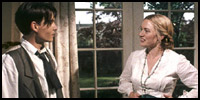 As confirmed by 2003's umpteenth, albeit delightful, remake of "Peter Pan," the fairy tale of a boy who refuses to grow up is timeless, refusing to die out as multiple versions seem to be made for each new generation. Directed by Marc Forster—a far cry from his devastating 2001 breakthrough, "Monster's Ball"—"Finding Neverland" is not a direct adaptation of "Peter Pan," but a whimsically sentimental drama based on the true story of how author J.M. Barrie came to write his seminal classic.
As confirmed by 2003's umpteenth, albeit delightful, remake of "Peter Pan," the fairy tale of a boy who refuses to grow up is timeless, refusing to die out as multiple versions seem to be made for each new generation. Directed by Marc Forster—a far cry from his devastating 2001 breakthrough, "Monster's Ball"—"Finding Neverland" is not a direct adaptation of "Peter Pan," but a whimsically sentimental drama based on the true story of how author J.M. Barrie came to write his seminal classic.
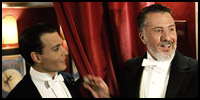 Set in 1903 London, playwright/author J.M. Barrie (Johnny Depp) is acclaimed by others for the plays he puts on, but feels as if he has yet to approach the quality he is capable of. That very groundbreaking work that has eluded him comes to an end when J.M. Barrie, something of a child himself, meets kindly widower Sylvia Davies (Kate Winslet) and her four young children. The six of them form a simple and genuine bond, with J.M. encouraging the kids to act their age and use their imaginations. His experiences with Sylvia and her sons, most notably the serious and withdrawn Peter (Freddie Highmore), gradually pave the way for what becomes "Peter Pan."
Set in 1903 London, playwright/author J.M. Barrie (Johnny Depp) is acclaimed by others for the plays he puts on, but feels as if he has yet to approach the quality he is capable of. That very groundbreaking work that has eluded him comes to an end when J.M. Barrie, something of a child himself, meets kindly widower Sylvia Davies (Kate Winslet) and her four young children. The six of them form a simple and genuine bond, with J.M. encouraging the kids to act their age and use their imaginations. His experiences with Sylvia and her sons, most notably the serious and withdrawn Peter (Freddie Highmore), gradually pave the way for what becomes "Peter Pan."
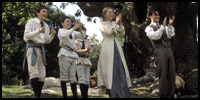 If the Academy chooses "Finding Neverland" to relegate its annual Miramax love upon with a flurry of nominations, it will not be because the film deserves it, but because it is inoffensive, moralistic, and emotional without being saccharine. The picture also happens to be based on actual events, which is always a plus when it comes to garnering respect, and features some heavy-duty talent in front of the camera, with Johnny Depp (2004's "Secret Window"), Kate Winslet (2004's "Eternal Sunshine of the Spotless Mind"), Dustin Hoffman (2004's "I ♥ Huckabees"), and Julie Christie (2004's "Harry Potter and the Prisoner of Azkaban") all being previous Oscar winners and nominees. Likewise, director Marc Forster's "Monster's Ball" was the deservedly acclaimed film that won Halle Berry her statuette. The pedigree may be there in spades, but, like Barrie's own frustrations in his attempt to create a watermark work, "Finding Neverland" never makes it past the level of slight, yet likable.
If the Academy chooses "Finding Neverland" to relegate its annual Miramax love upon with a flurry of nominations, it will not be because the film deserves it, but because it is inoffensive, moralistic, and emotional without being saccharine. The picture also happens to be based on actual events, which is always a plus when it comes to garnering respect, and features some heavy-duty talent in front of the camera, with Johnny Depp (2004's "Secret Window"), Kate Winslet (2004's "Eternal Sunshine of the Spotless Mind"), Dustin Hoffman (2004's "I ♥ Huckabees"), and Julie Christie (2004's "Harry Potter and the Prisoner of Azkaban") all being previous Oscar winners and nominees. Likewise, director Marc Forster's "Monster's Ball" was the deservedly acclaimed film that won Halle Berry her statuette. The pedigree may be there in spades, but, like Barrie's own frustrations in his attempt to create a watermark work, "Finding Neverland" never makes it past the level of slight, yet likable.
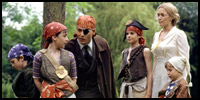 Those looking for an in-depth biography on J.M. Barrie are bound to walk away disappointed, but anyone with an appreciation for "Peter Pan" and little knowledge of its author will find enough dramatic rewards and flights of fancy to make the 106-minute running time worthwhile. Set in the actual world of 1903 but apt to waver into unexpected fantasy sequences to juxtapose how reality has a major hand in influencing fiction, "Finding Neverland" is unforcedly ironic and, by the end, significantly poignant.
Those looking for an in-depth biography on J.M. Barrie are bound to walk away disappointed, but anyone with an appreciation for "Peter Pan" and little knowledge of its author will find enough dramatic rewards and flights of fancy to make the 106-minute running time worthwhile. Set in the actual world of 1903 but apt to waver into unexpected fantasy sequences to juxtapose how reality has a major hand in influencing fiction, "Finding Neverland" is unforcedly ironic and, by the end, significantly poignant.
 The plot machinations creak more than a few times on its road to this climactic high point, no more so than in the way a person's cough in one scene blatantly telegraphs the rest of the film's tragic-cum-uplifting trajectory. What raises this development above disease-of-the-week status is in the way the dying character marches forward with a brave face to benefit those around them. It additionally helps that the illness is intentionally never labeled, proving the point that it doesn't matter why he or she is sick, only that it will hold a marked impact on a number of loved ones and cannot be cured.
The plot machinations creak more than a few times on its road to this climactic high point, no more so than in the way a person's cough in one scene blatantly telegraphs the rest of the film's tragic-cum-uplifting trajectory. What raises this development above disease-of-the-week status is in the way the dying character marches forward with a brave face to benefit those around them. It additionally helps that the illness is intentionally never labeled, proving the point that it doesn't matter why he or she is sick, only that it will hold a marked impact on a number of loved ones and cannot be cured.
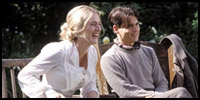 In the constant talk of a place called Neverland and a subtle suggestion that pedophilia is suspected (but immediately denied) in the relationship between Barrie and Sylvia's young sons, "Finding Neverland" regretfully brings about thoughts of Michael Jackson and recent accusations toward him concerning child molestation. It is all the more a shame because the film is gloriously, refreshingly innocent and has not a mean bone in its body. In fact, one of the major themes present in "Finding Neverland," mirroring J.M. Barrie's belief that childhood is a time to be cherished and held onto, goes against these unwanted but inevitable real-life allusions and remains totally pure of heart. The friendship between Barrie and Sylvia, as well as the one between Barrie and Peter, are tenderly portrayed and affecting, and the frequent steps from reality into fantasy are gorgeous to behold and humanely relevant rather than cloying and cute.
In the constant talk of a place called Neverland and a subtle suggestion that pedophilia is suspected (but immediately denied) in the relationship between Barrie and Sylvia's young sons, "Finding Neverland" regretfully brings about thoughts of Michael Jackson and recent accusations toward him concerning child molestation. It is all the more a shame because the film is gloriously, refreshingly innocent and has not a mean bone in its body. In fact, one of the major themes present in "Finding Neverland," mirroring J.M. Barrie's belief that childhood is a time to be cherished and held onto, goes against these unwanted but inevitable real-life allusions and remains totally pure of heart. The friendship between Barrie and Sylvia, as well as the one between Barrie and Peter, are tenderly portrayed and affecting, and the frequent steps from reality into fantasy are gorgeous to behold and humanely relevant rather than cloying and cute.
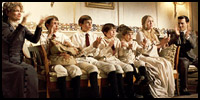 The simple, unadulterated joy captured on the faces of the children and, later, adults as they watch a stage version of "Peter Pan" tells more about the man behind the work than "Finding Neverland" ever manages through dialogue and exposition. The film, then, becomes more about the general expression of innocence in a world where children are forced to grow up too fast than a clear-cut or satisfying biography of J.M. Barrie. The fine performances by Johnny Depp, as the idealized J.M. Barrie; Kate Winslet, as the stubborn but loving Sylvia Davies; and newcomer Freddie Highmore, as Peter, as well as the movie's keen mixture of whimsy with reality, and adulthood with childhood, aid in smoothing out the kinks. They cannot, however, save the work of Radha Mitchell (2004's "Man on Fire"), who sleepwalks through her role as Barrie's ignored wife, Mary, speaking in such hushed tones that she is a chore to watch, and Dustin Hoffman, instantly forgettable as Barrie's producer, Charles Frohman.
The simple, unadulterated joy captured on the faces of the children and, later, adults as they watch a stage version of "Peter Pan" tells more about the man behind the work than "Finding Neverland" ever manages through dialogue and exposition. The film, then, becomes more about the general expression of innocence in a world where children are forced to grow up too fast than a clear-cut or satisfying biography of J.M. Barrie. The fine performances by Johnny Depp, as the idealized J.M. Barrie; Kate Winslet, as the stubborn but loving Sylvia Davies; and newcomer Freddie Highmore, as Peter, as well as the movie's keen mixture of whimsy with reality, and adulthood with childhood, aid in smoothing out the kinks. They cannot, however, save the work of Radha Mitchell (2004's "Man on Fire"), who sleepwalks through her role as Barrie's ignored wife, Mary, speaking in such hushed tones that she is a chore to watch, and Dustin Hoffman, instantly forgettable as Barrie's producer, Charles Frohman.
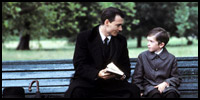 Viewers may not learn much of substance about the late, great J.M. Barrie from "Finding Neverland"—he is more of an enigma than a three-dimensional character—but the essence of "Peter Pan"'s morals and ideas, still as timely today as they were 100 years ago, remain largely and affectionately intact.
Viewers may not learn much of substance about the late, great J.M. Barrie from "Finding Neverland"—he is more of an enigma than a three-dimensional character—but the essence of "Peter Pan"'s morals and ideas, still as timely today as they were 100 years ago, remain largely and affectionately intact.
|
© 2004 by Dustin Putman |














